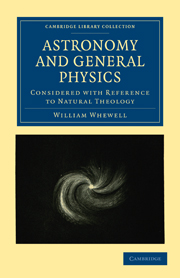Book contents
- Frontmatter
- NOTICE
- Contents
- INTRODUCTION
- BOOK I TERRESTRIAL ADAPTATIONS
- BOOK II COSMICAL ARRANGEMENTS
- BOOK III RELIGIOUS VIEWS
- CHAP. I The Creator of the Physical World is the Governor of the Moral World
- CHAP. II On the Vastness of the Universe
- CHAP. III On Man's Place in the Universe
- CHAP. IV On the Impression produced by the Contemplation of Laws of Nature; or, on the Conviction that Law implies Mind
- CHAP. V On Inductive Habits; or, on the Impression produced on Men's Minds by discovering Laws of Nature
- CHAP. VI On Deductive Habits; or, on the Impression produced on Men's Minds by tracing the consequences of ascertained Laws
- CHAP. VII On Final Causes
- CHAP. VIII On the Physical Agency of the Deity
CHAP. V - On Inductive Habits; or, on the Impression produced on Men's Minds by discovering Laws of Nature
from BOOK III - RELIGIOUS VIEWS
Published online by Cambridge University Press: 05 August 2011
- Frontmatter
- NOTICE
- Contents
- INTRODUCTION
- BOOK I TERRESTRIAL ADAPTATIONS
- BOOK II COSMICAL ARRANGEMENTS
- BOOK III RELIGIOUS VIEWS
- CHAP. I The Creator of the Physical World is the Governor of the Moral World
- CHAP. II On the Vastness of the Universe
- CHAP. III On Man's Place in the Universe
- CHAP. IV On the Impression produced by the Contemplation of Laws of Nature; or, on the Conviction that Law implies Mind
- CHAP. V On Inductive Habits; or, on the Impression produced on Men's Minds by discovering Laws of Nature
- CHAP. VI On Deductive Habits; or, on the Impression produced on Men's Minds by tracing the consequences of ascertained Laws
- CHAP. VII On Final Causes
- CHAP. VIII On the Physical Agency of the Deity
Summary
The object of physical science is to discover such laws and properties as those of which we have spoken in the last chapter. In this task, undoubtedly a progress has been made on which we may well look with pleasure and admiration; yet we cannot hesitate to confess that the extent of our knowledge on such subjects bears no proportion to that of our ignorance. Of the great and comprehensive laws which rule over the widest provinces of natural phenomena, few have yet been disclosed to us. And the names of the philosophers, whose high office it has been to detect such laws, are even yet far from numerous. In looking back at the path by which science has advanced to its present position, we see the names of the great discoverers shine out like luminaries, few and scattered along the line: by far the largest portion of the space is occupied by those whose comparatively humble office it was to verify, to develope, to apply the general truths which the discoverers brought to light.
It will readily be conceived that it is no easy matter, if it be possible, to analyse the process of thought by which laws of nature have thus been discovered; a process which, as we have said, has been in so few instances successfully performed. We shall not here make any attempt at such an analysis.
- Type
- Chapter
- Information
- Publisher: Cambridge University PressPrint publication year: 2009First published in: 1833



